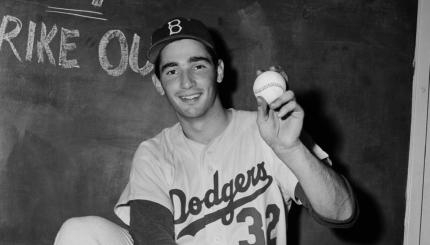I once heard Sarah Silverman tell a joke about the pride Jews inevitably take in the accomplishments of other Jews. To paraphrase, she said there are even Jews out there who will state, with nodding satisfaction, “You know the Son of Sam killer? A Jew!”
It does seem that for us Jews, every accomplishment casts a glow of achievement on the community as a whole. Albert Einstein didn’t revolutionize our understanding of the mechanics of the universe—we did! Maybe it’s because there simply aren’t many Jews out there—just under 14 million globally, as compared to, say, 1.2 billion Catholics—and every triumph strikes us as a feat of chutzpah over demographic gravity. Or maybe it’s because Jewish history is pocked with so many attempts to terminate Jewish history, every Nobel Prize or even Golden Globe stands as an affirmation that not only are we still here, but, hey look!, we’re thriving. I can’t fully explain the phenomenon, but I certainly share in it. And I believe it’s one of those particularly Jewish traits that cuts across all flavors of Jewish identity. When a Jewish child wins a spelling bee, it’s like every Jew from Boca to Crown Heights to Beijing wants to both give the kid a hug and brag about what great spellers the Jews are.
I touched on this collective pride in individual achievement in my novel,
The Book of Jonah
, in describing the protagonist’s outlook on his own Judaism. The Jonah of my book, an ambitious young lawyer who is suddenly beset by inexplicable visions, never goes to synagogue and has only the vaguest ideas about God. Not atypically, though, he still thinks of himself as fully Jewish: “He liked the community of Judaism: the instant bond he felt toward any -berg, -man, or -stein he encountered—the connection he could claim to the familiar litany of distinguished Jews*.”
The familiar litany of distinguished Jews is what I want to try to catalogue in this post: the go-to list of folks that Jews most often name when they’re blowing the shofar of Jewish accomplishment. These names get tossed around so often in synagogue and at BBYO regional events, there really ought to be a Passover song for them—maybe to the tune of Chad Gadya. I can’t offer that, but I can at least compile their names. Think of this as one’s man’s effort to chisel out the Jewish Mount Rushmore.
(One caveat: I chose to limit myself to Jews who made their mark in the 20th century or later. I did this, first, because the names I most often hear fall into this category, but more so that so that I wouldn’t get angry Tweets from rabbis for including the Rambam but not the Ran or something.)
Albert Einstein: The undisputed champion of the world of Jewish pride. I mean, he’s popularly regarded as the smartest man who ever lived: That’s going to win you some acclaim in the tribe.
Sigmund Freud: The father of psychoanalysis. You really can’t overstate the impact Freud has had on the way we think—and if you disagree, I think you have daddy issues, and ought to be in therapy.
Golda Meir: Before there was Hillary, before there was Margaret, there was Golda, one of the first democratically elected female heads of state, and further proof that yes, your grandmother could if given the opportunity win a war.
Sandy Koufax: In the galaxy of Jewish athletes, Sandy Koufax is the sun and seven of the planets. Bonus points for that time he didn’t pitch on Yom Kippur.
Bob Dylan: Probably the most accomplished musician of the twentieth century, Robert Zimmerman also owned his Jewfro like no one before or since.
Philip Roth
: On the short list of greatest American writers of the last century and the source of innumerable awkward book club conversations.
Stephen Sondheim: Okay, okay, I know this is an idiosyncratic choice, but if you care about Broadway, you—right, moving on.
The Coen Brothers: Even the movies you forget when you’re listing all their movies (Barton Fink, Raising Arizona, A Serious Man) are classics. Walter Sobchak gives them the edge on this list over Woody Allen. Shomer Shabbos!
So, that’s my list. Who did I leave off?
*I made a slight edit to this sentence to avoid redundancy, but hey, it’s my sentence, right?
The Visiting Scribes series was produced by the Jewish Book Council‘s blog, The Prosen People.
The Jewish world is full of debates. Get the latest in MyJewishLearning’s weekly blogs newsletter.
shofar
Pronounced: sho-FAR or SHO-far, Origin: Hebrew, a ram’s horn that is sounded during the month of Elul, on Rosh Hashanah, and on Yom Kippur. It is mentioned numerous times in the Bible, in reference to its ceremonial use in the Temple and to its function as a signal-horn of war.


